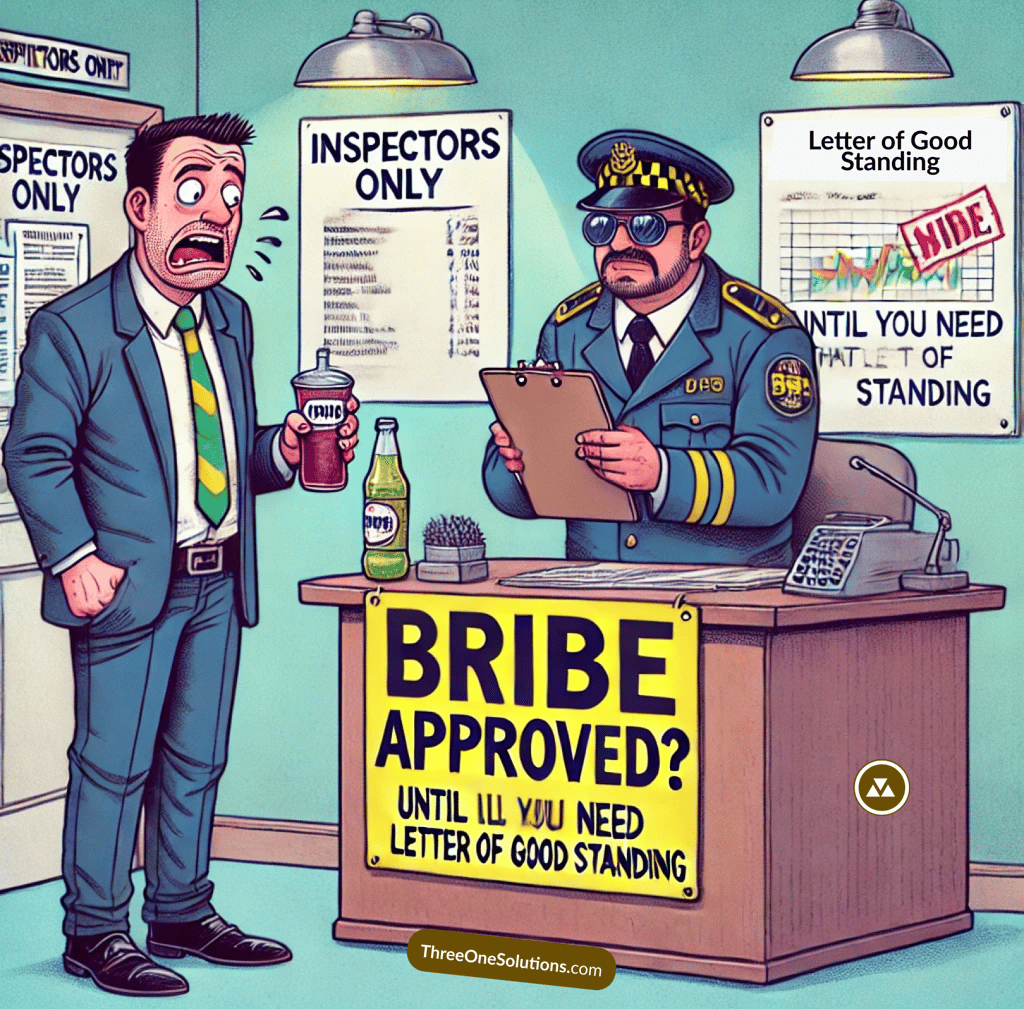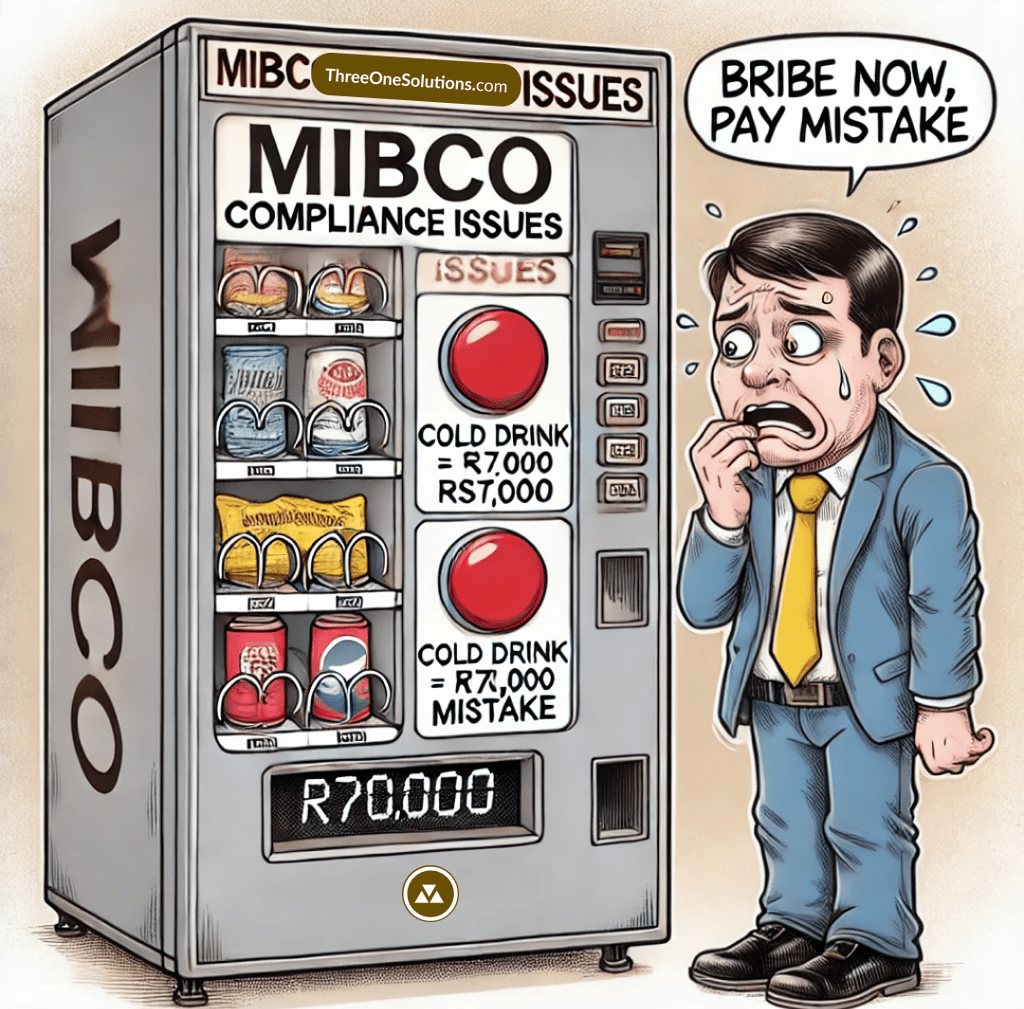The Risk of Bribing MIBCO Inspectors (Hypothetical Example)
Discover the risks of bribing MIBCO inspectors in this educational example. Learn how compliance mistakes can cost businesses and how to avoid them with expert help.
Elleck Mgiba
11/23/20242 min read


A Costly Mistake
Imagine you’re running a company. The inspectors arrive for a compliance check. Instead of facing the audit, you offer them a "cold drink" to smooth things over.
It seems like an easy way to avoid fines or issues. But what happens when you need a Letter of Good Standing to secure a big contract? Suddenly, all those shortcuts come back to haunt you.
The Shortcut: A Hypothetical Scenario
An employer, let’s call him Mr. X, tries to bypass compliance. During inspections, Mr. X offers inspectors small bribes to avoid non-compliance notices. This lets him sidestep registering employees for provident funds, paying levies, and correcting underpayments.
For years, everything seems fine. But then Mr. X’s company needs a Letter of Good Standing to finalize a major supplier contract. Now, the truth comes to light.
The Fallout: A Hypothetical Scenario
The council finds two underpayment cases, totaling R20,000 owed to employees since 2021. Worse, Mr. X hasn’t deducted provident fund contributions from his employees since 2018.
A compliance expert calculates the unpaid contributions. Here’s what they find:
Employee 1: R39,800.75 in backdated deductions.
Employee 2: R29,546.75 in backdated deductions.
Total: R69,347.50.
To make matters worse, Mr. X now faces the challenge of deducting these backdated contributions from employee salaries. This creates several risks:
Employee Consent: Employees must sign an acknowledgment of debt. Without this, deductions cannot proceed.
Resignation Risk: Employees may quit rather than agree to high deductions.
Legal Limits: Deductions cannot exceed 30% of gross income. For one employee, this means R631.75 weekly over 63 weeks. For the other, it’s R404.75 weekly over 73 weeks.
Mr. X owes R70,000 in council returns. He must settle it through a Dispute Resolution Centre (DRC) agreement.


The Steps: How It Unfolds
Non-Compliance: Skipping deductions creates financial gaps.
The Reveal: A Letter of Good Standing shows unresolved issues.
The Calculation: Backdated amounts create big liabilities.
The Consequences: Employees resist deductions, risking resignations and legal problems.
The Resolution: Mr. X faces settlements and delayed payments, hurting cash flow and credibility.
The Lesson
Bribing inspectors to avoid compliance isn’t a shortcut—it’s a ticking time bomb. The hidden costs, employee mistrust, and legal risks far outweigh any temporary convenience. Compliance isn’t just a regulatory obligation; it’s a foundation for sustainable growth and trust.
Avoid these costly mistakes before they happen. At Three One Solutions, we help you stay compliant, avoid penalties, and build trust with employees and councils alike.
Need help investigating your compliance status or resolving disputes? Click here to start today.
Don’t wait for a crisis—invest in compliance now to secure your business's future.
We are the solution you've been looking for, not the one you've been stuck with.
MIBCO Compliance Solutions
The Company
Articles
Affiliate Program
Referral Program
MIBCO Minimum Wage 2024/2025 Update: New 3-Year Deal (2025–2028)
Three One Solutions is a Compliance Management Company for South Africa's Motor Industry. Our vision is to see SA without unhappy employers and employees in the Motor Industry. Our mission is to make life better for employers and employees in SA's Motor Industry. We give people confidence, knowledge, and solutions to stay MIBCO compliant. Want to make sure your business or the one you work for is MIBCO compliant? You're in the right place.
Copyright © 2025 EM Mgiba Investments (Pty) Ltd Registration No. 2015/256789/07 T/A Three One Solutions. All Rights Reserved. Marketing by Cleymand.com
What Customers Say
Careers
Shop Our HR Templates
Case Studies


